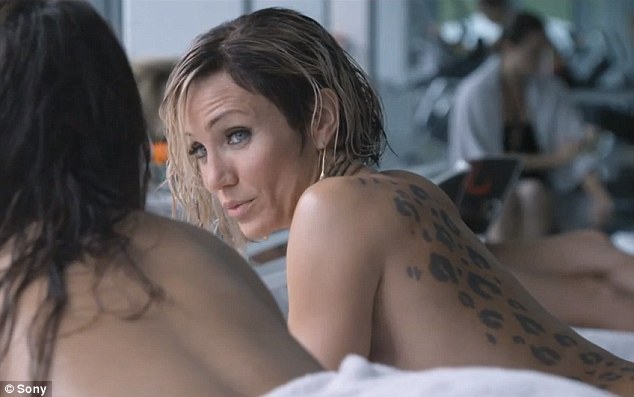By Armond White
Novelist Cormac McCarthy must have been a fan of Breaking Bad since he steals its byzantine plot–its essence–for The Counselor, the film billed as his “first original screenplay.” The combination cynicism-and-pretense that motivates this crime film about a lawyer (Michael Fassbender) who gains wealth from assisting clients in drug deals, repeats the same moral confusion that is the hallmark of today’s more celebrated TV shows–especially the twisted absurdity of Breaking Bad. This corruption is not profound but for sophomoric minds it is trendy and sussing out trends is part of director Ridley Scott’s headless hack method.
 “Headless” fits because Scott’s cynicism complements McCarthy’s; it’s evident in The Counselor’s leitmotif–various forms of grisly decapitations that are reminders of Scott’s ultra-hackery in Hannibal (where Anthony Hopkins ate from Ray Liotta’s exposed brain). The Counselor outdoes the treachery of Breaking Bad with several gruesome, headless killings. You need to be a TV-junkie to enjoy this mindlessness.
“Headless” fits because Scott’s cynicism complements McCarthy’s; it’s evident in The Counselor’s leitmotif–various forms of grisly decapitations that are reminders of Scott’s ultra-hackery in Hannibal (where Anthony Hopkins ate from Ray Liotta’s exposed brain). The Counselor outdoes the treachery of Breaking Bad with several gruesome, headless killings. You need to be a TV-junkie to enjoy this mindlessness.
Yet The Counselor is a swanky form of junk with Fassbender and his trophy girlfriend (Penelope Cruz) enjoying a ritzy lifestyle along with his bling-loving client Reiner (Javier Bardem) and his unfathomably cynical, bisexual moll Malkina (Cameron Diaz) who keeps two pet cheetahs, wears a gold tooth, silver fingernails and has cheetah spots tattooed across her back. It’s almost a comic version of the luxe afforded to big-name filmmakers like Scott. Getting rich off cynicism is a hoary theme indulged–and overscaled–by filmmakers who profit from cynicism.
Pulitizer Prizer McCarthy peddles cynicism like a huckster who’s found a sure-fire gimmick. His script overflows with bone-headed, pseudo-profundities that weigh upon the story. This kind of thing works for TV viewers who are lazily impressed by literary attitude borrowed from hard-boiled fiction–a pretense special to HBO’s Boomer sarcasm and favored by middle-brow media outlets from the Times to Entertainment Weekly. McCarthy adds an existential gloss that seems overly ambitious for the big screen when Scott adds flashy visual, kinetic excess. Yet McCarthy’s self-seriousness slows Scott’s roll; The Counselor is mostly about dialogue.
The exchanges are howlers: “Greed really takes you to the edge.” “That’s not what greed does, that’s what greed is.” Or: “That’s a bit cold.” “Truth has no temperature.” Or: “We announce to the darkness that we will not be diminished by the brevity of our lives.” My favorite is a barely remembered rant from philosophical drug kingpin Ruben Blades: “Our extinction is a thingamabob that resignation cannot whatchamagig.” And there’s worse. (Not a single witticism matches the political joke in Costa-Gavras’ Capital where a custom-tailor asks his new millionaire boss, “Do you dress Right or Left?”)
The Counselor’s richly terrible jabber exposes a creativity deficit. The cast–the sinister Fassbender, a hapless Brad Pitt repeating his Se7en tragedy and a superbly steely-eyed Diaz–only gets credit for keeping their faces straight. McCarthy and Scott give so much attention to treachery, snark and assorted means of killing–from pickling bodies in barrels to several decapitation contraptions (including a snuff film)–that they lose the moral decline sweepstakes to Breaking Bad. They fail to measure the social era like Oliver Stone’s fascinating drug tale Savages or Costa-Gavras’ Capital or such classic John Huston melodramas as The Asphalt Jungle and Beat the Devil.
After the Coen Brothers’ No Country For Old Men, McCarthy’s Hollywood stock went up. The Counselor should settle that. I never finished Blood Meridian–the only McCarthy book I’ve opened–but if this is the kind of crap McCarthy writes, I don’t feel I’ve missed anything.
Follow Armond White on Twitter at 3xchair
